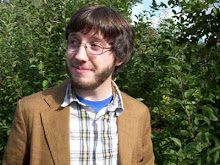For the past few weeks, I've been hearing individual tracks from the Arcade Fire's new album, The Suburbs, on the radio. To be honest, I wasn't overly impressed. The songs were okay, and some of them were great a few minutes in, but there was no single that completely wowed me. I was worried, because the band's earlier albums, Funeral
and Neon Bible
, are some of my favorites. I stopped worrying when I heard the whole album
, though.
I've read a lot of music critics who talk about the album as a dead object, an artifact of the pre-iTunes world. "People put their music on shuffle," they say. I am paraphrasing. But the new Arcade Fire album disagrees. Like the Decemberists' Hazards of Love, "The Suburbs" is a long-player, an album designed to go together as a whole. And when I finally listened to it as that, I felt like I understood what they were doing.
The first track, the title track, is like a statement of the album's themes:
"Kids wanna be so hard
But in my dreams we're still screamin' and runnin' through the yard
And all of the walls that they built in the seventies finally fall
And all of the houses they build in the seventies finally fall
Meant nothin' at all"
The spread of the suburbs vs. the fear of the bomb is, I think, the driving idea of the album. A landscape of poorly-built houses that keeps on expanding, but toward what? And what happens to the people who keep on building and expanding these suburbs? I know these aren't exactly new themes, but I think this is the first record that does real justice to these ideas.
My current favorite track on the album, "City With No Children," touches on something that was present in the opening tracks of "Funeral," the idea of a neighborhood after the adults have gone. In this song, the kids from that album have grown up, and the neighborhood is a wreck. There's an allusion to the Sermon on the Mount, with the idea that the meek shall inherit the earth and the mourners will be comforted. The narrator of the song, and the whole album, seems to look around for that comfort, distraught over the suburban sprawl he has inherited.
I don't think any band uses setting in their songs quite like the Arcade Fire, and the new album really expands on that, asking what happens when the landscape becomes too much to bear, when it takes on a life of its own. The album is huge, its themes and images spreading out as it goes on to encompass the regrets and nostalgia of its narrator. It ends with a look back and the statement that "If I could have it back, all the time that we wasted, I'd only waste it again." Sure, there are allusions to natural disasters, atomic cataclysm, and abandoned neighborhoods scattered throughout the album, but the resounding point of the album is that the most destructive force, the element that obliterates the memories and forces the narrator out into a more terrifying world, is time.
Wednesday, August 4, 2010
Musical Wednesdays: The Suburbs
Labels:
Music,
Musical Wednesdays
Subscribe to:
Post Comments (Atom)

4 comments:
definitely gonna check this one out
I recommend it, but listen to the album beginning to end the first time.
I really love this record. For a similar subject matter (albeit with a totally different type of music), I'd check out Read Music/Speak Spanish by Desaparecidos. It shares the same obsessions.
Nice post.
(On another note, nice to meet you today; your blog, right now, is a welcome distraction from my writing.)
I find this album particularly exciting because it's about the experience of growing UP in the suburbs, not the--by now WELL-plumbed--experience of being an adult who moves INTO the suburbs. We haven't had nearly as much deeply affecting art--in any medium, I'd say--that explores the former as we have of the latter.
Post a Comment